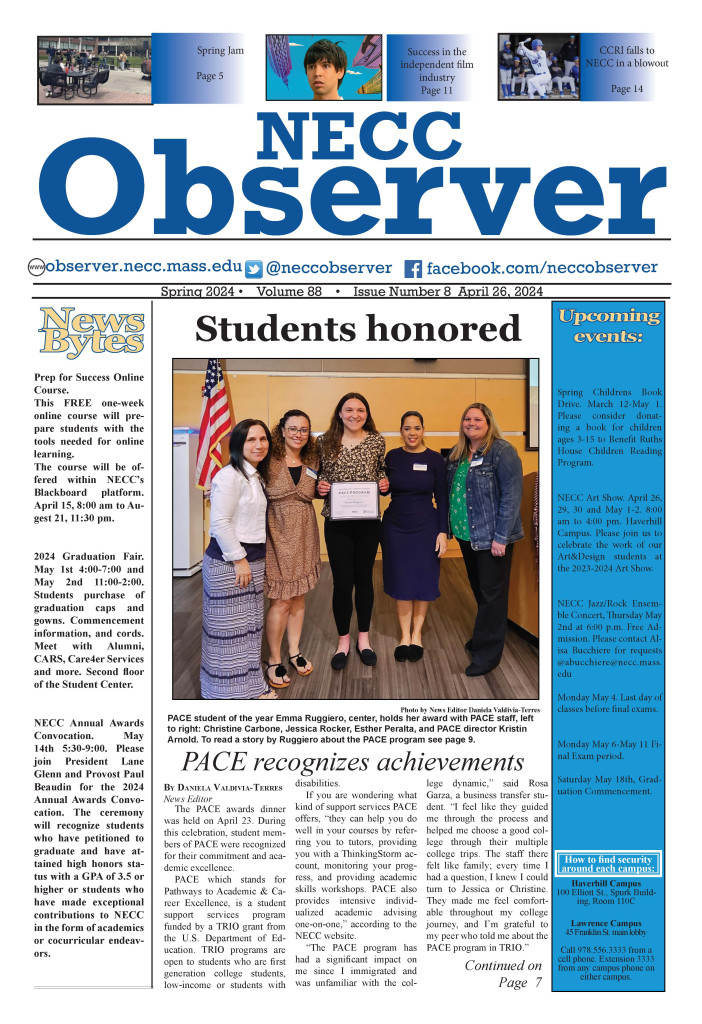There are over 100 veterans and current or former military members attending classes at NECC, but many may not know that they are even around.
Veterans often carry themselves differently than the typical student by showing leadership, promoting teamwork and displaying self-discipline. However, according to a study by the U.S. Army Medical Department, student veterans and servicemembers frequently face three main challenges: having meaningful social interactions with other non-military students, adjusting to the cultural differences between military and student/civilian life and adjusting to one’s role outside of the military.
Many former military members use their professional background to the advantage of themselves and others.
“I bring life experience to the table, and (students) see that,” said Eddie Hoar, former U.S. Army service member and journalism/communication major at NECC. He followed up by saying that he had to “ease back into college life,” as the combination of his military experience and other life challenges made the transition difficult.
Hoar is also a member of NECC’s club for veterans: the Veterans and Servicepersons Organization, or VSO for short. The VSO’s mission is to provide social and cultural support to student veterans by helping to bridge the gaps related to the common struggles experienced by service members after their military service.
However, some veterans may find it difficult to adjust to student life if they don’t feel comfortable with identifying themselves as such.
“Veterans are unknown on campus,” said Cory Chambers, an Iraq war veteran, engineering science major and the vice president of the VSO. “Why is that?” he asked.
Self-identification is a key struggle across many educational institutions in regards to trying to promote a comfortable environment for student veterans and servicemembers. The aforementioned study found that many veterans may not want to identify themselves as such for many reasons, such as the fear of social stigma or wanting to put their “service behind them.” However, many of the study’s respondents also stated that student veterans’ programs “should be highly visible and promoted to encourage participation.”
“It is what they make of it,” said Veterans Services Coordinator and VSO advisor Jeff Williams, who has served for 29 years in the U.S. Army Reserves, including a combat tour to Iraq. “The administration is always so supportive. Student veterans just have to tell me what they need.”
Williams is a strong proponent of positive change for student veterans and servicemembers at NECC. His most recent accomplishment is his addition of two work study students, which will allow him to help more student veterans in a more effective manner by allowing him more time attend to more pressing issues.
Williams has also been trying to make NECC feel more welcoming for current and future student veterans by his active support in trying to appoint a private study space for veterans and servicemembers and also trying to create a specialized orientation program solely geared toward incoming students with military experience.
One of Williams’ current main goals is to make the Veterans Center more “attractive” to student veterans, meaning he’d like more people to go in to study or talk, or just to communicate their concerns.
Veterans Service is located in the Student Center on NECC’s Haverhill campus in room SC-216, and it is open from 9 a.m. to 5 p.m. on Mondays, Tuesdays and Fridays, and 10 a.m. to 6 p.m. on Thursdays.
Coordinator Williams also provides support for students in Lawrence at the El Hefni building’s advising center from 9 a.m. to 5 p.m. Work study hours may vary.
For more information, please email Veterans Services at veteransservices@necc.mass.edu or call (978) 556-3631.
Olsen, Timothy, Karen Badger, and Michael D. McCuddy. “Understanding The Student Veterans’ College Experience: An Exploratory Study.” U.S. Army Medical Department Journal (2014): 101-108. Academic Search Premier. Web. 7 Apr. 2015.

